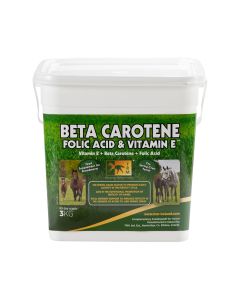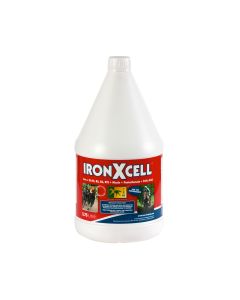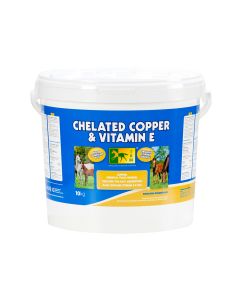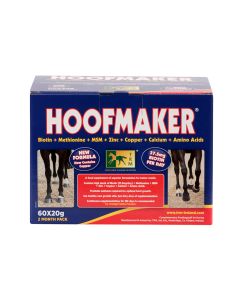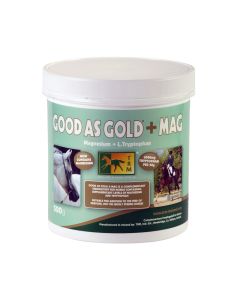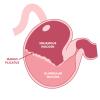
Vitamins
In many respects these organic compounds are similar to the trace elements. Both are needed in minute quantities (milligrams) in the diet, they have a wide range of functions in the body and they are essential for normal metabolism in the animal.
Vitamins are classified as either fat-soluble or water-soluble based on how these are stored within the body. The major fat-soluble vitamins include vitamins A, D, and E. These vitamins are important for vision, calcium absorption and regulation, and as a primary antioxidant within the body protecting cells and muscle function.
Fat-soluble vitamins are stored within the fat deposits of the body and can accumulate giving the potential of toxicity if overfed. The other classification of vitamins is water-soluble vitamins. These vitamins are often referred to as B-vitamins. They include thiamin, riboflavin, niacin, biotin, and folic acid. These vitamins function in nearly every chemical reaction within the body; therefore, they are critical in metabolism, growth, and energy generation.
| VITAMIN |
NEEDED FOR |
DEFICIENCIES |
Vitamin A (Retinol) |
Integrity of mucous membranes |
Impaired vision, stiffness of limbs, anorexia |
Thiamine (B1) |
Enzymes |
Blindness, muscle tremors, grinding
of the teeth |
Riboflavin (B2) |
Enzymes, H-transport |
Scouring, soreness in corners of mouth, shedding of hair |
Niacin (B3) |
Co-enzymes, H-transport |
Nerve degeneration |
Pantothenic Acid (B5) |
Enzymes |
Anorexia, reduced growth, rough haircoat, nervous disorders |
Pyridoxine (B6) |
Enzymes |
Anorexia, scouring, convulsive seizures |
Cobalamin(B12) |
Enzymes |
Anorexia |
Biotin (H) |
Enzymes |
Skin problems |
Choline |
Cell structure |
Retarded growth, fatty liver |
Folic Acid |
Amino-acid synthesis and metabolism |
Retarded growth, anaemia |
Vitamin K |
Prothrombin synthesis |
Severe haemorrhaging |
Vitamin D |
Bone formation and metabolism
of Ca, P and Mg |
Bone defects and weakness |
Vitamin E |
Antioxidant |
Linked with SE, muscle disorders |
Vitamin C |
Immune response |
Disease resistance very low |
B-carotene |
Precursor of vit A, (may have role in infertility) |
|
Trace Elements
The performance and general health of a horse is related directly to a solid nutrition programme. Horses require a different level of nutrition based upon factors including age, activity levels and discipline. Trace Minerals including zinc, copper, manganese are essential for horse health, growth and performance.
These vital trace elements are needed for a variety of functions in the body's metabolism, as shown below:
TRACE
ELEMENT |
NEEDED FOR |
DEFICIENCY |
COMMENT |
COPPER |
Enzymes, haemoglobin |
Infertility, anaemia, bone
disorders, discoloration
of pigmentation, impaired
immune function |
Can be toxic in excess.
Can be inhibited by S, Mo,
Fe and Zn. |
IRON |
Haemoglobin, myoglobin, Fe-enzymes |
Anaemia |
Failure to thrive |
IODINE |
Thyroxine |
Under active thyroid, infertility, reduced milk yield |
Severe deficiency results
in enlarge thyroid (goitre) |
MANGANESE |
Protein synthesis, enzyme activity |
Infertility, bone deformation in young |
No signs of oestrus in the female |
ZINC |
Integrity of epithelial
surfaces, enzymes, immune response |
Poor skin and hooves, parakeratosis high sommatic cell count |
Itching eczema is indication
of shortage. Unthrifty
appearance |
SELENIUM |
Cell integrity, removal of free radicals |
Impaired immune response, infertility, muscle disease |
Is component of enzyme GSH-Px; acts along with Vitamin E |
Magnesium |
It is an essential
mineral present in all
tissues, especially in bone and is also needed for
muscle and nerve function. |
Progressive muscle
weakness and neuromuscular
dysfunction |
Regular intake of high dose supplements can result in diarrhoea |
Sodium |
Responsible for regulating body water content and electrolyte balance |
Rarely a problem due to high levels in feeds. An excess is usually more of a concern |
The kidney regulates the amount of sodium in the body |
Potassium |
Potassium is essential for water and electrolyte balance and the normal functioning of cells,
including nerves. |
Symptoms include weakness, mental confusion and, if extreme, heart failure. |
High supplementary doses of potassium can be harmful especially if the kidneys are not functioning properly. |
Related articles:
Everything you need to know about B Vitamins for horses (B Vitamins & Iron)
Preparing for a successful breading season in spring 2022 (Beta-carotene, folic acid & vitamin E)
How to keep your horse calm: A guide to a stress-free show (Magnesium, B-Vitamins and L-Tryptophan)
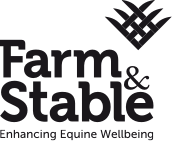

 Forgotten your password?
Forgotten your password?  Free Delivery on all orders over £95+VAT
Free Delivery on all orders over £95+VAT


